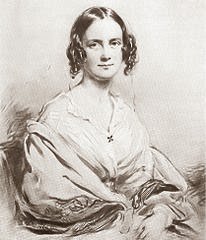 Wikipedia paints an interesting picture of marriages in Victorian Britain (Women in the Victorian era):
Wikipedia paints an interesting picture of marriages in Victorian Britain (Women in the Victorian era):
When a Victorian man and woman married, the rights of the woman were legally given over to her spouse. Under the law the married couple became one entity where the husband would represent this entity, placing him in control of all property, earnings and money. In addition to losing money and material goods to their husbands, Victorian wives became property to their husbands, giving them rights to what their bodies produced: children, sex and domestic labour. Marriage abrogated a woman's right to consent to sexual intercourse with her husband, giving him 'ownership' over her body. Their mutual matrimonial consent therefore became a contract to give herself to her husband as he desired. The extent to which Emma was involved in the decision to spend more than half of her time pregnant is therefore open to debate. Both her letters and those of her husband do not, as far as I know, reveal any marital difficulties — indeed, quite the contrary. However, Charles' has left us written evidence of his pre-marital ideas about marriage (Darwin’s notes on marriage), which indicate his specific intention to have a family available in his old age.
Note that there are reported to have between two miscarriages between the 9th and 10th births, one in 1852 (when Emma was 44 years old) and one in 1854 (when she was 46). Emma was 48 years and 7 months old when she delivered her final child. Along with the miscarriages, it is worth noting that the final child was born mentally disabled (probably Down's syndrome, for which there is a 1 in 11 chance at age 49), and he died after 18 months. Also, the third child was born after only 36 weeks of pregnancy (instead of the "normal" 40 weeks), and lived for less than a month. Darwin's favorite child was his 2nd (Anne), who unfortunately died of tuberculosis at age 10. The remaining seven children survived to adulthood.
We can also note that the children were born during most periods of the year, as shown in the next graph. However, five of the births were during the 3-month period from early July to late September, implying conception during the period October to December.
In English-speaking countries there is a peak of births in late September, 9 months after the Christmas celebrations (Wellings et al. 1999; Tita et al. 2001). (In Scandinavia, the birth peak is 9 months after the mid-summer celebrations.) Given that two of the births were in this period, we might accuse the Darwins of fitting into this behavioral cliché. However, one of the these two births was the shortened pregnancy, so that conception in that case was on or near to their 3rd wedding anniversary, rather than Christmas. The other conception dates do not fit any pattern that I can see.
All of the above data lead me to the conclusion that most, if not all, of the pregnancies were the result of more-or-less continuously ongoing sexual activity, rather than being the result of deliberate attempts to conceive, or being incidental by-products of celebratory activity. That is, the pregnancies occurred as chance dictated, given the night-time activities being undertaken.
This leads us to the key question of how often these activities took place. We can do some general calculations that might be informative.
Calculation
We now know that the potentially fertile period of human female ovulation is 12 days out of every 28, and vaginal sex during this period should be avoided if you do not wish to be involved in a pregnancy (Arévalo et al. 1999). Within this window of opportunity there is a 6-day period during which conception is most likely (Dunson et al. 2002; Stirnemann et al. 2013), and if you are trying to conceive a child then sex at least twice during this period is the recommended strategy. (Each egg lasts 1 day, but sperm last for 3 days, so that sex more than 2-3 times doesn't seem to improve your chances.) Clearly, sex once during this 6-day period is a reasonable minimum expectation for conception.








